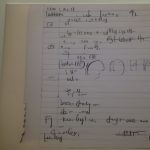22 Ways To Sharpen Your Study Skills During Summer Break

Watch an indie film with your friends and discuss it over coffee, drinks, or lunch later on.
We specify indie film here because most summer blockbuster films do not challenge the viewer when it comes to interpreting meaning and dealing with ambivalence. When a movie really makes you think and challenges you to fill in the blanks on at least some of the material, it helps you grow intellectually. Even better, taking a group of your brainier friends with you and then discussing your thoughts on the film later on can help expand your understanding of what you’ve just seen. It’s also nice to have the outing.
Go for a run.
When running, it is not uncommon for one’s thoughts to drift and focus on a thought or problem. Giving your body something to do frees your mind, essentially, to tackle things in a unique way. The act of running recharges your brain and can really bring clarity.
Read a non-fiction book on a subject of interest.
For me growing up, that subject of interest was something my classes never taught me. I knew that I loved movies, and always wondered what was so different about writing a film versus a short story or novel. That led me to pick up Syd Field’s famous how-to book on the matter, simply entitled “Screenplay.” If you have a subject of interest that your classes never allow you to spend time with, then the summer is a great time to focus. In so doing, it will sharpen many of the study skills you use during the school year.
Have a reading goal for the summer as a whole.
Not all reading should be confined to non-fiction, of course, but you can include those types of books when developing your summer reading list. You typically have more time during the summer break than during the school year. Use it wisely. Pop in to that Goodreads account you forgot about, and set a goal of how many books you plan to read per week or month. Then, challenge yourself to hit those goals.
Study for a standardized or professional exam like the ACT or PRAXIS.
If you’re further along in school and know that exams, such as the ACT or PRAXIS, will be necessary to your career, then get a head start on learning the material you need to know.
Daily meditation, twice per day.
Transcendental meditation is really quite simple to do, and it has many mental health benefits. By meditating for 20 minutes at a time, twice per day, once in the morning and afternoon, you’ll be able to shed the pressures of performance and focus your mind on things that matter. It’s a good idea to meditate when you first get out of bed, and then any time in the afternoon. Sit in your favorite chair, feet flat on the floor, close your eyes and try to let go of everything clouding your mind. You’ll be surprised at how alert it makes you.
Start a business or freelance.
Mow yards, do a Kickstarter campaign, write articles for websites — there are numerous ideas out there that allow you to work from home or a coffee shop, and many of them won’t cost you any money to start. Get in touch with your inner entrepreneur, even if you don’t plan on running your own business over the long haul. The act of setting a goal and pushing through to completion, is a great way to independence and awakening your inner self-starter.
Up the hours on your summer job.
If you already have a job, or if you’re just starting one, make sure you work as much as possible, because it keeps you out of bed and interacting with other people. This social component can go a long way in preventing mental atrophy.
General time with friends.
Again, it’s the social thing. When you’re hanging out with friends, the opportunity to interact and learn from one another will keep you from settling in to unhealthy summer break habits.
Write a book or short story.
You don’t have to be a wordsmith to write a book or short story. The great thing about doing this activity, is that it keeps your mind fresh and your communication skills solid. No one even has to see it! But if you are the writerly type, this is a great opportunity to do something about it.
Journal.
As an extension of writing a book or short story, you may choose journaling, which is simply capturing your thoughts and actions from the day. You can use your journal as a barometer of progress in the areas that matter to you. Just sit down with pen and paper at the end of the day and before bed, and force yourself to write for 20 minutes about the things you did, your thoughts on those actions, and the goals you’d like to accomplish by the end of summer break.
Visit a museum.
Many towns have at least one museum, and hiding within those walls, are some fascinating stories that will give you a new appreciation for the place where you live. Even in a mediocre museum, you can typically spend a whole day and find lots of neat stuff. Take some friends along, so there is a social component, and so neither of you miss anything cool.
Road trip.
Summer break does allow one to catch up on their sleep, but it’s far better to plan an exciting trip with people you care about, and take a road trip. You can learn a lot about each other and about a new region. Just make sure it’s something you can afford.
Summer classes.
Just because it’s summer time, that doesn’t mean the organized learning has stopped. Many schools offer summer classes as well as institutions and museums. For instance, in the town where I live, the local art museum has a number of different courses open to the public during the summer.
Limit social media, email, and texting to an hour per day.
We know this is a hard one, but we also know from experience how poisonous these forms of technology can be to productivity. By limiting yourself to just one hour per day (combined), you can ensure that the rest of your time is spent doing something more worthwhile, like living life and experiencing the world around you.
Sleep.
We don’t want you to sleep too much during your summer break — after all, there’s a great big world out there to enjoy — but sleep is still important to recharging your mental batteries. Follow the rule of eight to 10 hours per day, but don’t go beyond that.
Volunteer.
Volunteering at a nursing home or boys’ and girls’ club is a great experience builder, and it can look good on the resume. Plus, there is a lot of satisfaction to be had just in knowing that you’ve done a good deed for someone else.
Ride your bike.
Similar to running, a bike ride can clear your head and help you to focus on projects to build both body and mind.
Start a band.
Like music enough that you’re capable of playing an instrument? Why not team up with some other musically minded friends and take on more gigs during the summer. You may not make much or any money, but you’ll probably be the coolest kid at the party, and it’ll help you learn whether a career in music is something you wish to pursue after high school or college.
Teach yourself a foreign language.
With apps like Duolingo, there really is very little excuse. If you’re wanting to spend some time on the smartphone, then why not do something useful with it, like learning Spanish or another foreign language for free?
Learn a skill.
CodeAcademy is an app that immediately comes to mind for this option. Instead of a foreign language, why not take on a skill like coding that will have some serious long-term viability? Welding is also a great option.
Job shadow or internship.
Have a professional in the family? See if you can job shadow them for a week just to get a taste of the life. Even if you don’t end up pursuing this pathway, it will give you the info you need to make an informed decision.
In Summary
While the summer break is yours to do with as you see fit, keep in mind that the more productivity you cram in to those two months, the better off you’ll be on the first day of school. And in a globally competitive world, you can’t afford to waste too much time. Take it easy, but also make yours productive. Best of luck!
[Image via GoStudy.ca]








